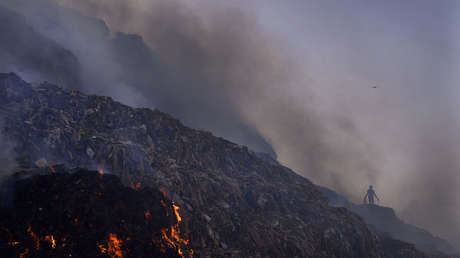The broader discussion of climate change has taken a backseat due to global crises and armed conflict in Europe, experts warn.
representatives of almost 200 countries have met within the framework of the United Nations Conference on Climate Change 2022, COP27, which began this Sunday in Sharm el Sheikh, Egypt, with the aim of guaranteeing the full implementation of the Paris Agreement to prevent the temperature rise 1.5 degrees Celsius by the end of the century.
Despite the fact that this year the agenda incorporates for the first time “financing agreements that respond to loss and damage” for the most vulnerable States, affected by disasters related to climate change, the table brings fewer new promises.
Keep promises
The COP27 summit takes place after a year of disasters, which includes from devastating floods in which they died more than 1,700 people in Pakistan, to heat waves and droughts in China, Africa and the western United States, which are an unequivocal sign of the climate emergency that crosses our planet.
This time, the summit will focus on the fulfillment of the promises made during the previous edition of the event, so no new significant commitments are expected. “It’s not always about ads,” said Linh Do, a climate leadership expert at the University of Melbourne, Australia, adding that “it also has to be about the work being done and about the policy details“.
The Secretary General of the United Nations, António Guterres, projection the need to “respond to the planet distress signal with action: ambitious and credible climate action”, emphasizing that COP27 is the place and time to do it. “The latest report on the state of the global climate is a chronicle of climate chaos,” he said.
a background
However, Do cautioned that the broader discussion of climate change has taken a backseatsince the global crises, the armed conflict in Europe, the energy crisis and the growing tensions between China and the US, leave the climate crisis as a less urgent concern for some leaders.
Likewise, Studio Bark, an inspiring environmental architecture studio, in a statement lamented that the official negotiations of COP26 have been “bitterly disappointing”, since “the climate crisis does not respond to objectives or promises“, therefore, “viable plans are necessary to change our global crisis and guarantee some kind of livable future” pick up the middle Dezeen.
From the COP26 in Glasgow (Scotland), only 29 of 194 countries submitted more stringent national plansaccording to a release published by the UN Climate Change Secretary, furthermore, advances in financing and adaptation have not been sufficient.
Lack of “financial will”
To respond to growing climate needs, for the first time an agreement to discuss compensation to poor nations for mounting damage related to global warming.
Vulnerable countries demand a special fund for ‘losses and damages’, arguing that the countries most vulnerable to climate change are the least responsible of the greenhouse gas emissions that have caused the problem. In this sense, the rich countries that caused most of the climate change with their historical emissions should now pay.
“We don’t want to be here, demanding funding for our response to loss and damage. We don’t want to be treated like they’re doing us a favor adding an item to the agenda or creating a voluntary fund,” said Conrod Hunte, chief climate change negotiator for the Alliance of Small Island States (AOSIS), a group of 39 small island and low-lying coastal developing nations, mostly from the Caribbean and South Pacific.

“AOSIS is here to agree to establish a new Loss and Damage Response Fund at COP27 that is operational by 2024. We are here to be able to return to our own homes and not become climate displaced people in theirs,” he added.
In this sense, Kabage Karanja, co-founder of the Cave Bureau, an office of architects and researchers who explore architecture and urban planning in nature, points out a lack of “financial will” of the richest countries and the biggest polluters, “not only to reduce emissions and address the impacts of climate change that negatively affect nations of the global South”, but also to “commit financially to bear the costs necessary to recover from these Adverse effects”.
“Climate change is here to stay”
Also, Marisa Drew, Director of Sustainability at Standard Chartered Bank, he pointed that “the world has become largely galvanized around the concept of mitigation, which is to reduce carbon emissions,” however, he stressed that we have to “deal with the reality that climate change is here to stay“, so financing is necessary to face this reality.
For her part, the head of the International Monetary Fund (IMF), Kristalina Georgieva, pointed out that rich countries alone “will not be enough to close” the financing gap for climate change, suggesting that it is necessary more private investments to help developing countries meet their targets, pick up the CNBC medium.
According to a report According to the UN, vulnerable and developing countries will need between $160 billion and $340 billion by the end of the decade to make climate-related changes, and even $565 billion by 2050.











